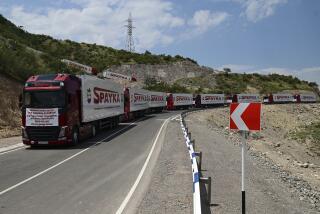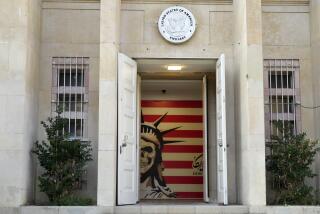Iranians brace for cutbacks in food and fuel subsidies
It’s not a good time to be a dry cleaner in downtown Tehran.
“I just bought a month’s supply of detergents and softeners and the cost was 40% higher than four months ago,” said Reza Salimi, standing behind the counter in his shop on Taleghani Street. “But inspectors from the Ministry of Commerce come to make sure I don’t raise my prices. They’re not allowing us to balance the rising costs we face.”
Stop in any store and the gripes are the same. Oil prices are down and unemployment and anger are high. Profits for small businesses are shrinking and the government, which has endured years of international sanctions, is wrestling with an economic overhaul package that may further inflame the public by cutting subsidies for food, fuel, electricity and even postal services.
A series of bills before the parliament would trim the nation’s $30-billion debt, much of it incurred from spending projects that have bought President Mahmoud Ahmadinejad support in the provinces. The overhaul package would also regulate energy consumption and allow the government to manipulate prices as a buffer against the possibility of new Western sanctions targeting Tehran’s petroleum industry.
The plan is tinged with the populism that has bolstered Ahmadinejad’s grass-roots appeal. It offers no breaks to the rich and middle class but extends certain subsidies to the poor. For example, the government would repeal the 40-cent subsidy on a liter of gasoline and use a portion of the money to increase aid to low-income families.
The sweeping proposal comes as the country is under enormous strain: Protests over Ahmadinejad’s disputed reelection in June have forced a crackdown on opposition parties, and the standoff with Washington over Tehran’s nuclear ambitions reverberates like a never-ending coda.
Some Iranian lawmakers are citing threats of new international sanctions to justify the subsidy cuts. Mohammad Karim Shahrzad, a member of the parliament’s budget committee, said Iran’s petroleum consumption is higher than the world average and that the “enemy will be able to exert pressure” on that vulnerability.
Akbar Akbarnejad is bracing for pain. He retired from making weapons in the defense industry to become a greengrocer in west Tehran. Like many Iranians, he has lived through years of hardship while his country broadened its influence across the Middle East even as its debt ballooned. He considers himself middle class, earning about $1,000 a month, but he fears subsidy cuts will leave him with fewer customers and higher bills.
“I do not believe politicians no matter what faction they’re in,” he said. “I just do not believe them and I anticipate that the new economic overhaul plan will make the prices shoot up. The government is bankrupt and wants to take the money from the pockets of people. That’s it.”
The economic package, which would phase out many subsidies over five years, has the potential to spur outrage similar to the 2007 riots over gasoline rationing. But conservative clerics and Ahmadinejad’s hard-line supporters are suggesting that the burden must be spread more evenly.
“It is oppression when 30% of society that is rich and middle class receives 70% of the subsidies. This must stop,” Ayatollah Ahmad Jannati, the hard-line secretary of the Guardian Council, said in a recent sermon. “There might be shock when the plan is implemented and mischievous people may misuse the shock to create a conspiracy. We need to be cautious.”
Iran, the second-largest oil producer in the Middle East, spends about $90 billion a year on subsidies. That was fine when oil prices were high, reaching nearly $150 a barrel in 2008. But with oil down to about $80 a barrel, and years of debt incurred by Ahmadinejad’s public works projects in rural regions, the Islamic Republic is overburdened. Some economists, however, believe that the new plan will further damage the economy by triggering inflation and reducing retail spending and investment.
“Re-targeting subsidies, especially petrol, will diminish the purchasing power of the middle class and potential investors and weaken the private sector,” said Jamshid Edalatian, an economist and member of Iran’s Chamber of Commerce. “It is a clever move because it gives it a pretext to increase the prices of everything, including fuel, and blame it on the ‘enemies and foreign countries imposing sanctions on Iran.’ This they can use to justify everything.”
President Obama raised the prospect of new sanctions in September, which led to Iran opening its second uranium enrichment plant to international inspectors last week. Congress is considering a bill that would punish foreign companies that sell refined petroleum to Iran. World powers and Tehran are negotiating a deal on the country’s uranium enrichment capabilities that may tone down talk of sanctions. The West believes that Tehran intends to build atomic weapons, but Iran says its program is for energy and medical purposes.
Political squabbling between Ahmadinejad and legislators has left the extent of the economic overhaul uncertain. On Tuesday, the president threatened to withdraw the subsidies package over a dispute with parliament on how any savings would be spent.
But Ahmed Hasanzadeh, who has an engineering degree from Azad University, believes that the nation is in for harsh times. A lack of jobs in his field forced him and his father, a retired factory worker who collects a $500 a month pension, to open a stationery shop. The store doesn’t earn much, but there are few other prospects.
“The overhaul plan aims to help the poor at the expense of the rich,” he said. “The newspapers are saying that in five years there will be no more subsidies. The economic life of the people will be different from now. There will be no more squandering of resources.”
Aziz Tabrizian, a grocer, has a disabled child and a wife who works as a teacher. The family is getting by, but Tabrizian worries about subsidy cuts increasing costs for his business. He sat the other day watching parliament debate the economic plan on TV. He senses that corruption will rise.
“It looks like we’ll have more expensive water, electricity, natural gas and sewage costs for our shops and apartments, so cheating and manipulating the meters will start,” he said. “Be sure we will find ways to cheat and manipulate the meters so that they read as much as we can afford to pay.”
--
Mostaghim is a special correspondent.
More to Read
Start your day right
Sign up for Essential California for news, features and recommendations from the L.A. Times and beyond in your inbox six days a week.
You may occasionally receive promotional content from the Los Angeles Times.







